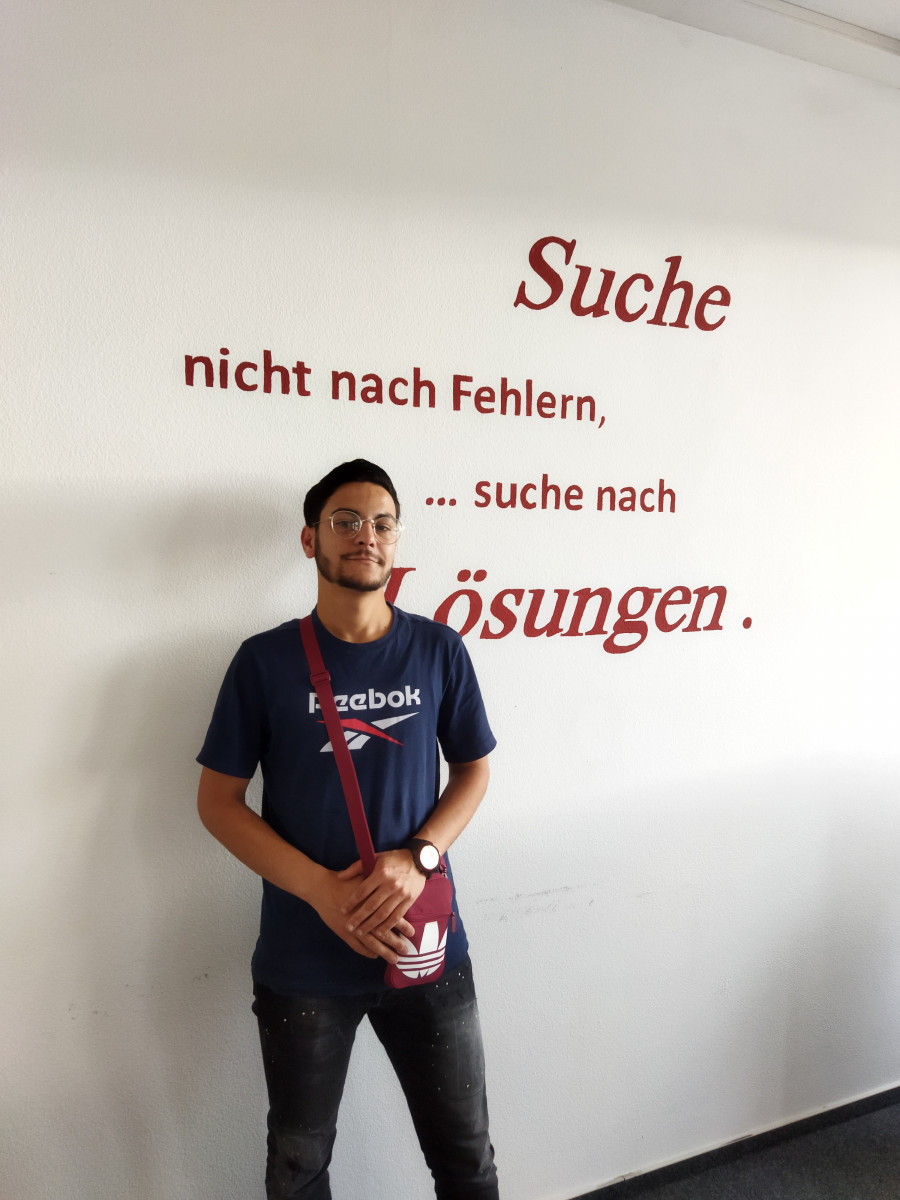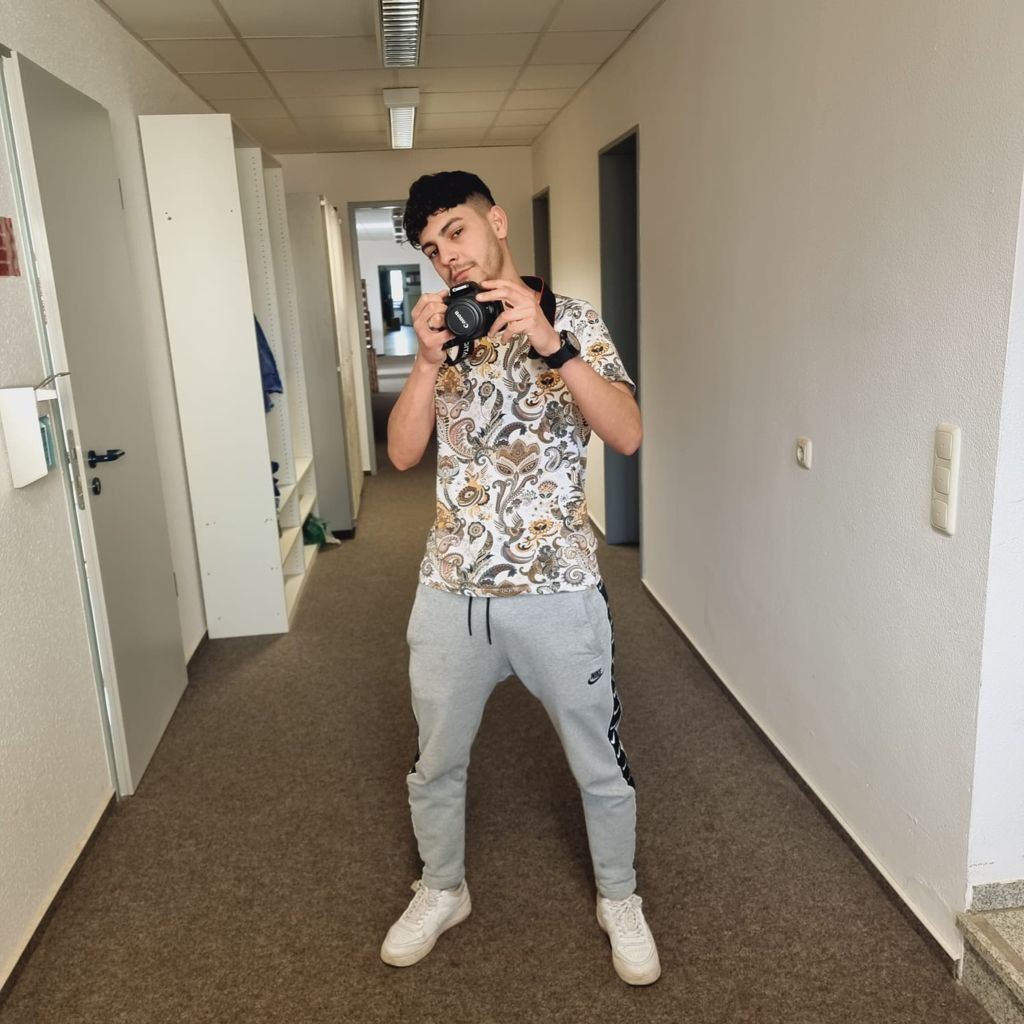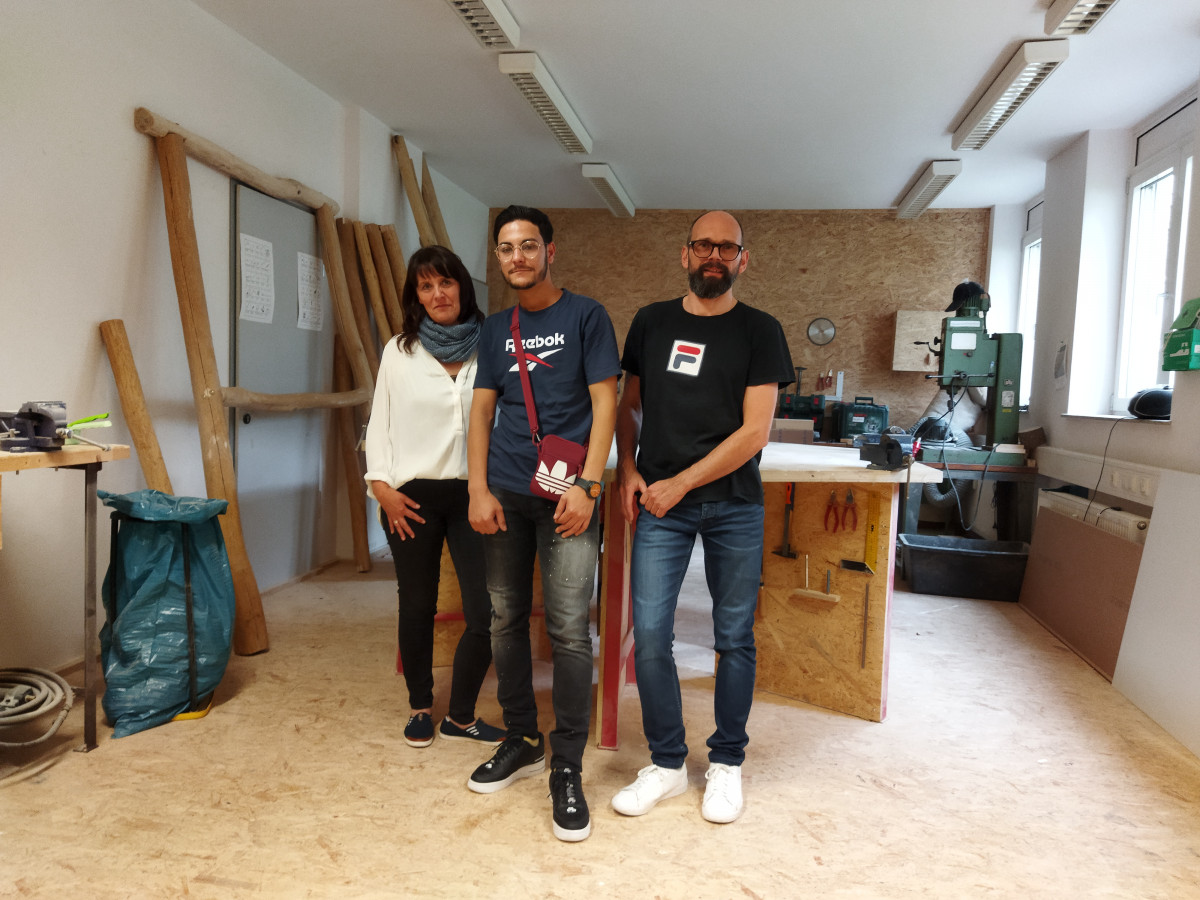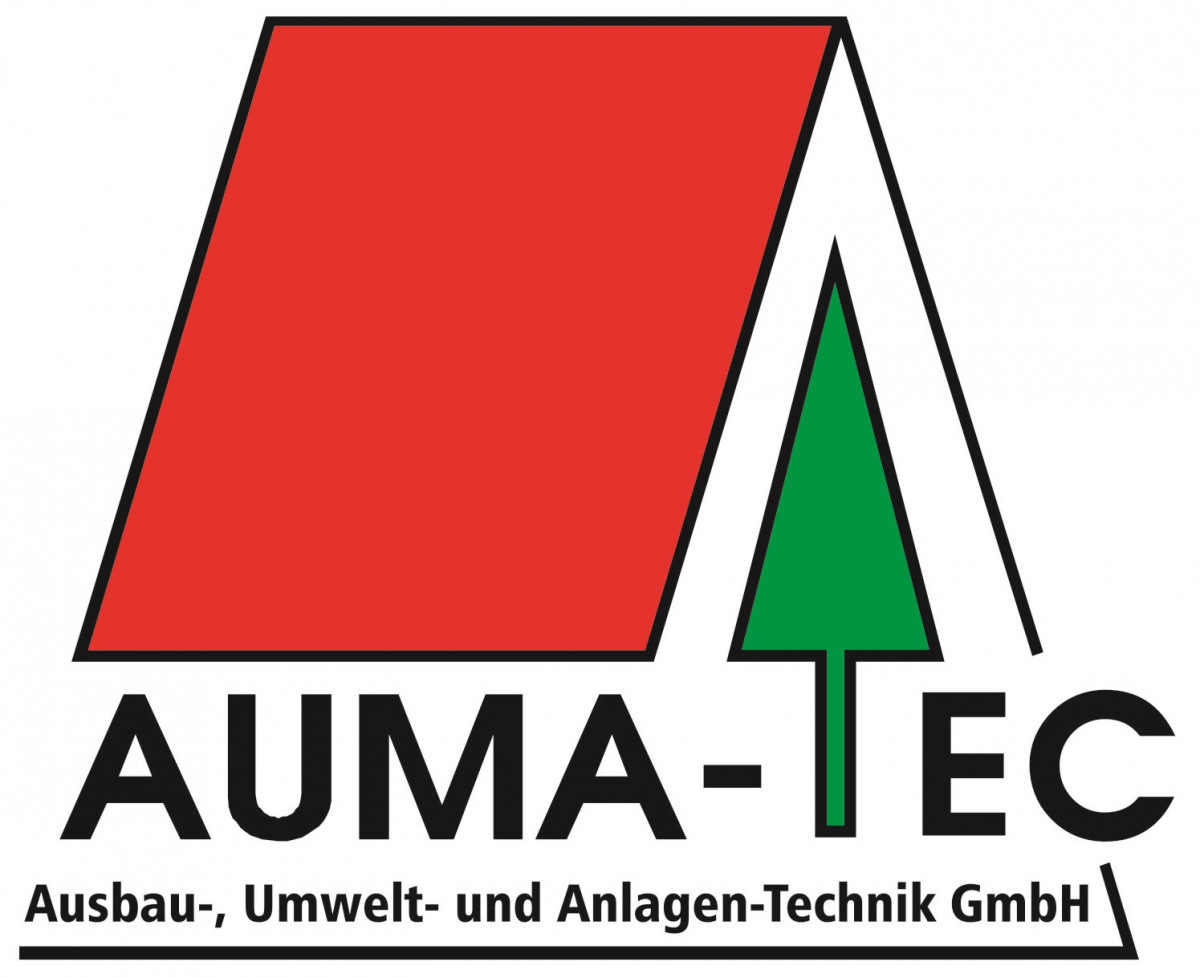Walid Nouar
I was on the verge of giving up and quitting a few times. But Mrs. Westenberger always supported me. So I persevered and I'm very glad I did.
Suhl
Interview with Walid Nouar
Walid Nouar made great progress in learning
Walid Nouar came to Ms. Katrin Westenberger for counseling in 2018 through a collaboration between his residential group in Untermaßfeld and the LAT project SIMBA at werkstatt bildung & medien GmbH (wbm) Suhl. Now, in the summer of 2021, Mr. Nouar has successfully mastered his first year of training at the Suhl-based company AUMA-TEC Ausbau-Umwelt- und Anlagentechnik GmbH. Not only Mrs. Westenberger is very proud of him. Mr. Nouar himself can also be seen to be very pleased: "I was on the verge of giving up and quitting a few times. But Mrs. Westenberger always supported me. So I persevered and am very happy about it."
Even for outsiders, it is amazing what Mr. Nouar has accomplished since joining the LAT project. He started with no knowledge of German at all, and within just one year in the SIMBA project he has made it to a good A2 level. Parallel to language support, which was already job-related - school attendance was not possible due to state regulations at the time - he received advice and support in the project on arriving, social and professional orientation, residence law issues and planning the next steps. Practical trials in the wood workshop were also included.
Finally, Walid Nouar was able to enter the "Start Bildung" course at wbm Suhl directly. In the course, he continued to learn job-related German - he passed the B1 exam - and received specialized instruction in mathematics as well as in political and social education. He continued to be supervised by Ms. Westenberger, who also supported him in establishing contacts and communicating with training companies.
From internship to apprenticeship
In fact, he immediately completed his first internship at AUMA-TEC, his current training company. "That was for a week. I liked it right away. I spent three days in AUMA-TEC's training workshop in Schleusingen and then did two more days of on-site observation at a construction site. Later, I did two more internships at AUMA-TEC and also took an entrance exam. That's when the boss said that I was also good enough in mathematics to start training as a plant mechanic."
Mr. Nouar had already gained initial practical experience on construction sites in his country of origin. But the work at his training company is much more complex. He works with complicated machines and on large projects - on the construction sites of hospitals, universities and the like. He says he likes that.
Jumping over stumbling blocks
When asked about the challenges, he becomes more reflective. "Vocational school is hard, of course. Everything often goes very fast there. And sometimes my brain just blocks, then nothing works at all." Mr. Nouar is very proactive about it: "I then ask my classmates and the teachers." And he also reports that he receives tutoring through abH (Ausbildungsbegleitende Hilfe). But that only works during the vocational school phases. During the practical phases, he and his team are always on the road for several days at a time throughout Germany - "on assembly" - in Stuttgart, Marburg and other places.
Mr. Nouar feels powerless when it comes to his stay. Ms. Westenberger reports for him: "He fulfilled the requirements for a training permit, and the training contract had been in place for a long time. Nevertheless, the authority responsible for him in Meiningen made the procedure more difficult for him. We had to get help and advice. Only one week before the start of the training was the training permit issued and the residence requirement for Suhl entered. This then made it possible for us to move to Suhl."
Mr. Nouar continues to persevere. "I'm doing the training now. There's no point in me giving up. And I'm glad that the people around me are nice. At wbm and also at AUMA-TEC. I feel comfortable there. I also still have contact with my former caregiver from the residential group."
Mr. Nouar really does a lot to make it work. "He works so hard that sometimes he falls asleep over the books," says Ms. Westenberger. And he keeps up communication with everyone. "We're like a family here at wbm," he says happily. That's one reason why he always stops by wbm on his days off, chats with Ms. Westenberger and his colleagues, and stays in active communication. Asked about his greatest wish, Walid Nouar says: "I would finally like to hold my mom again. Unfortunately, she doesn't live in Germany."
(August, 2021)


Interview with Katrin Westenberger from the LAT project SIMBA
Customised and close-knit support
Katrin Westenberger beams as the interview begins. In the SIMBA project, she advises and supports young refugees and prepares them for entry into training or a profession. The participants are often still very young because, until recently, the Thuringian School Act provided hardly any opportunities for over 16-year-olds to attend regular school: "Walid joined the project in 2018 together with other young refugees. It was a really great group. We really started from scratch - with the language, but also with vocational orientation. And there were and still are a lot of difficult legal issues to sort out. That welded us together and the cohesion is still there. Before corona, we also had a lot of social activities built in - we went climbing, went on excursions and played football."
Anyone who talks to Mrs Westenberger can see that she is convinced of the purpose of her work. The case of Walid Nouar is a good example of how early, customised and close-knit support can be effective: "Walid naturally brought a lot to the table. He is very intelligent and a great learner and has a high level of social skills. But he also really had a lot of challenges and hurdles to overcome - the language, his stay, the journey between his accommodation and the project location or to the internship location. And each of the participants also brings their own story with them. A lot comes up in some situations. It can be very gruelling to endure the difficult phases and not give up."
Project work and networking
For the participants, the support and encouragement provided by the LAT project SIMBA proves to be helpful in several ways. The LAT project is well networked with integration stakeholders in the region - for example with the residential group through which Mr Nouar was also placed in the LAT project. There are also good working relationships with the immigration authorities and the job centre in Suhl, as well as the UMA network in the region, and with other authorities and social partners. There are also well-established contacts with regional companies, which come into play when it comes to vocational orientation and placement in training and work. SIMBA also takes into account important aspects for early and targeted integration, such as (job-related) language support, vocational orientation and trialling - including in the in-house wood workshop - and placement and support during the transition to education, training and work.
Mr Nouar benefited from the fact that the A2 language level he achieved in the SIMBA project enabled him to go straight into the "Start Bildung" course at wbm and thus continue to have Mrs Westenberger as his direct contact person. "The best moment really was when Walid rang me when it was so difficult with the training toleration and he wanted to give up everything. He rang me and said: 'I'm going to keep going. I'm fighting to make it'. I'm really very proud of him."
With a view to future work, Ms Westenberger concludes: "I expect the authorities to make use of the legally regulated discretionary powers. That's the only way professional integration is possible. In Walid's case, it was really so difficult with the training toleration - I often spoke to Mr Reumschüssel from the LAT office and Ms Welker from the Thuringian IvAF network BLEIBdran on the phone. And then the companies have to open up - like AUMA-TEC, where Walid is now doing his training. And of course I hope that the project funding will continue so that we can continue to support and accompany people on their way into work and training."
(August, 2021)

Interview with Susanne Riedel from AUMA-TEC GmbH
Walid Nouar's requirements for training
Susanne Riedel is Managing Director of AUMA-TEC GmbH in Suhl. The family-run, medium-sized company with around 75 employees equips industrial, corporate and residential buildings throughout Germany in the field of supply technology (sanitary, heating, air conditioning).
Ms Riedel is delighted that Mr Nouar has started his apprenticeship at AUMA-TEC and that he is doing so well: "Mr Nouar is a really good example. He has shown that he has sufficient language skills, is motivated and is also good enough at maths (without a school-leaving certificate)." Ms Riedel explains that training to become a plant mechanic for sanitary, heating and air conditioning technology is very demanding, partly because it combines several previously separate professions. "Without a good understanding of maths and physics, it won't work. Trainees must not lose touch at vocational school, otherwise they won't be able to complete their training. Not everyone can do that," she reports.
In fact, the company is always on the lookout for new trainees. And a lot is done to achieve this. AUMA-TEC always offers internships first and then there is also an entrance test. "It is very important that the future trainees get a good insight into the profession in order to really make a conscious decision in favour of training. Only then is there a high probability that they will actually complete the apprenticeship," explains Ms Riedel. The training company is also in constant contact with the vocational schools. After all, they want to know how things are going and whether any further support is needed.
Openness of the company
The company is very open to international employees. "The big construction sites are very international anyway, and so are we." Slovakians, Syrians, Latvians and others work at AUMA-TEC. Even before Mr Nouar, there was a Tajik apprentice who learnt quickly and settled into the team very well. "We search on online platforms and via training providers such as wbm. It's good when there is external preparation and support. As a company, we can be sure that the applicant has the right qualifications. It's also less work for us than if we had to look for them ourselves. The support is also great for follow-up support during the apprenticeship. Our experience has been really good."
She would like politicians and chambers to lower the barriers to qualification for people who are unable to complete an apprenticeship in this complex occupational field straight away - be it because of the language, which still needs to be developed, or because of the technical requirements. As a company, they would very much welcome it if, for example, one-year qualifications to become a qualified helper were possible. This would allow suitable candidates to work practically for a while after completing the qualification and then - if their language skills are right and their other prerequisites are better - they could go on to complete a skilled worker qualification. This has little to do with an unwillingness to pay good wages, as is often criticised.
Ms Riedel reiterates that she is glad that Mr Nouar is completing his training at her company. "We hope that he will continue to develop so well and complete his training so that we can continue to employ him afterwards. Yes, that is our wish."
(August, 2021)

Mehr über das Projekt erfahren Weitere Praxisbeispiele ansehen